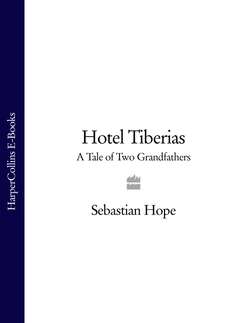Читать книгу Hotel Tiberias: A Tale of Two Grandfathers - Sebastian Hope - Страница 14
Chapter Four
ОглавлениеIn 1979, three years after General Sir John Hackett retired from his post at King’s College, he gave an interview to a researcher from the Imperial War Museum for its sound archive. A second recording was made twelve years later and together the two sessions last four and a half hours. They reveal as much about Hackett’s public persona as the events recounted. They cover his time in the Middle East and his experiences during the Second World War. On both occasions he speaks with such fluency and precision, displaying his great range of knowledge and power of memory. The 81-year-old general of the last two reels is a little more forgetful and in the last fifteen minutes he repeats a story he finished telling the first time but ten minutes earlier. Yet even this repetition reveals just how polished his performance is; in retelling the story he uses the same form of words and the same intonation as he did on the first occasion.
There is a clunk as the tape recorder is turned on, and then the interviewer’s voice some way from the microphone states, ‘Sir John Hackett, reel one. When did you first go to the Middle East, Sir John?’ From the first syllable of Hackett’s reply – a mere ‘er’ – you can see his three-piece tweed suit, his regimental tie, thin grey hair slicked flat over capacious pate, pale blue eyes, arched nostrils, the clipped moustache. He says: ‘Er, other than a brief visit to Egypt for twenty-four hours off a P&O ship …’ and continues without a pause for the next eleven minutes, until the interviewer finally interjects into Hackett’s flow on a trivial point and produces nothing but a digression. He keeps quiet after that, saying during the following twenty minutes only ‘Just milk, please’ to Lady Hackett’s enquiry as to how he took his tea. Shortly after there is the sound of a door-latch lifting as somebody leaves the room, the rattle before the thumb-plate is depressed and the wrought-iron latch rises with a clack. It is instantly recognisable as the door furniture of the drawing room at Coberley Mill. As a spoon chinks against a saucer the pattern on the china becomes visible.
Hackett’s is a voice from a different era, the accent betraying no hint of his Australian upbringing, the pronunciation received, patrician and retaining elements of pre-war vowel sounds – not so affected that he says ‘haice’ for ‘house’, or ‘awff’ for ‘off’, but there is a hint of that diction, which it seems has survived into the twenty-first century solely among members of the Royal Family, when he says ‘lawst’ for ‘lost’. He is a man who has become accustomed to people listening to what he has to say, and a military manner creeps in occasionally; at one point he corrects himself with a bluff ‘no, as you were …’ He paints a picture of life in the Cairo Cavalry Brigade with fondness, ‘a very healthy, agreeable, highly social life … with a lot of leave … a life that has disappeared. Nobody worked in the afternoon, you weren’t expected to … Every officer was expected as a matter of course to have his visiting cards and [you] had to go through a ritual of calling on the designated people when first you arrived.’ The formality of British society abroad is encapsulated in this custom, the obligatory calls on the High Commissioner and the commanders of the British Troops in Egypt and the Egyptian Army. ‘Your card had on it “Mr J. W. Hackett, Cavalry Club”. You would no doubt be asked to attend garden parties later.’
‘Of course we had a good deal of fun …’ and to illustrate this the general recounts a tale of Cairo high-jinx that occurred one Saturday night in Shepheard’s Hotel:
the souffragi who was at the cloakroom counter … was an old Egyptian whom I knew quite well. He was sick, he’d had injections that day and was very, very unwell but didn’t like to disclose this because he thought it might even jeopardize his job so I took over from him, put on his clothes and his tarbush … he was a fair coloured Egyptian and I was pretty sunburnt as we all were. His clothing fitted me and all that evening I spent taking the coats of people I knew and then putting them on again without being recognized by one of them, except a businessman there who looked round in surprise when in an excess of professional zeal I not only helped him into his coat, but put my hand up inside his great coat to settle his tailcoat down underneath it by a tug at the tails, which of course is the right thing to do, but which the souffragi had never done and he was so surprised at this extra special treatment, I suppose I was a little flown with wine for I had a bottle of champagne under the desk and was refreshing myself from time to time, he was so surprised that he looked round and was the only person that evening who recognized me. But he didn’t say anything to you? He said, ‘Hello it’s you is it?’ and I said, ‘Yes, but please don’t tell anybody.’ Later the souffragi had recovered and came back and took over from me, and I put on my tailcoat again and went and rejoined the party from which I had absented myself, and nobody asked any questions. Anyway it was an agreeable and not an unfunny life.…
